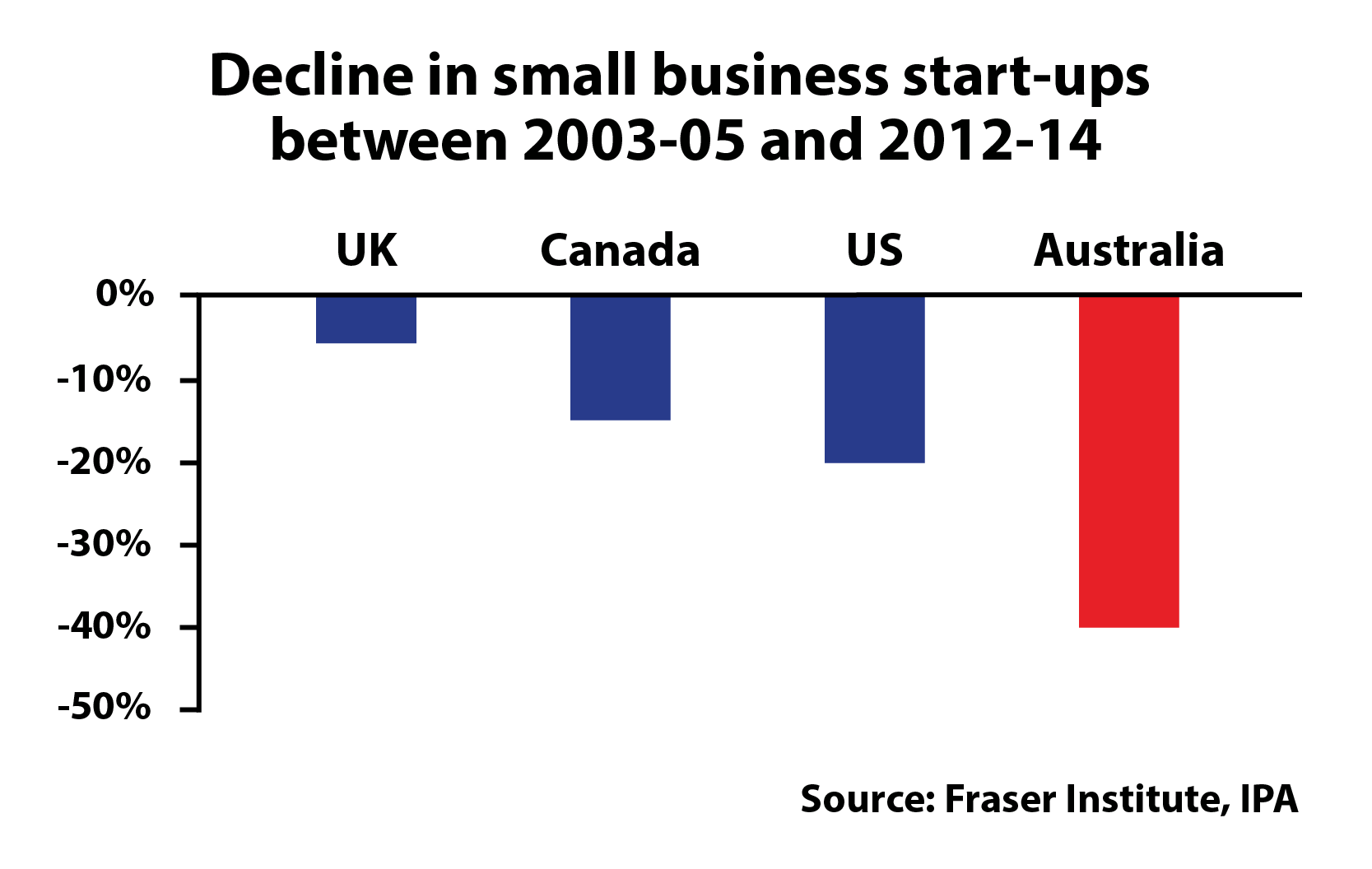Australia is has experienced a gigantic fall in entrepreneurship. Between 2003-05 and 2012-14, small business start-ups — as a percentage of all small businesses — declined by 40 per cent. This decline is substantially larger decline than in comparable countries, including the United States, United Kingdom, Canada, and Germany.
This is a key finding from a new book by the Fraser Institute in Canada, published in collaboration with the Institute of Public Affairs, which explores the importance of mitigating the effects of an ageing population on entrepreneurial activity.
 Entrepreneurship is the backbone of a successful, growing, and innovative economy. New firms challenge existing practices and ensure jobs and investment are allocated to their most worthwhile ventures. This raises living standards by delivering new products, creating jobs, and boosting wages.
Entrepreneurship is the backbone of a successful, growing, and innovative economy. New firms challenge existing practices and ensure jobs and investment are allocated to their most worthwhile ventures. This raises living standards by delivering new products, creating jobs, and boosting wages.
This is what Joseph A. Schumpeter called creative destruction: the ‘process of industrial mutation… that incessantly revolutionizes the economic structure from within, incessantly destroying the old one, incessantly creating a new one’.
Australia, along with other Western developed nations, has experienced a downturn in entrepreneurship that will only worsen over time as the population ages. The percentage of Australians in the key entrepreneurial age group, those aged 25-to-49, has declined from 38 per cent to 35 per cent and will reach 30 per cent by 2065.
While government cannot do much to prevent an ageing population, it is becoming increasingly essential that policymakers take steps to reinvigorate entrepreneurial activity. The IPA has found that there would be 250,000 more businesses in Australia today if business growth had continued pace with pre-Global Financial Crisis levels.
A key barrier to entrepreneurship is a nation’s level of taxation. Australia now has the third highest company tax rate in the OECD, following substantial reductions years of reductions in the United Kingdom and the United States. High taxes reduce available savings for entrepreneurial state-ups and reduces the potential rewards of starting a business.
Australia’s businesses face some of the highest corporate taxes in the world. The World Economic Forum ranks Australia at 102nd out of 138 countries for total tax burden, including corporate, labour and profit taxes. The United States has reduced their corporate tax from 35 per cent to 21 per cent, Britain is already at 19 per cent, and, in our region, Singapore’s rate is 17 per cent, and Hong Kong is 16.5 per cent.
Capital investment is extremely mobile. Australia’s relatively high corporate tax rate reduces potential returns, meaning fewer businesses and fewer jobs. Business investment has already shrunk to 12 per cent of GDP and is projected by Macquarie Wealth Management to fall to 9 per cent.
Red tape is holding back Australia’s entrepreneurial spirit. The IPA has calculated that red tape costs $176 billion a year in lost economic opportunity, an average of $19,300 for each Australian household.
According to the World Economic Forum, Australia is ranked 80 out of 137 countries for the burden of regulation. The OECD ranks Australia at 20 out of 47 countries for barriers to entrepreneurship, which considers the regulatory burdens such as licences and protection of incumbents. We have more barriers than similar liberal market economies such as New Zealand, Canada, and the United Kingdom.
Red tape prevents entrepreneurs from experimenting with new ideas, technologies and starting new businesses. Existing firms are often sympathetic to red tape, as they have adjusted to the cost and it prevents competitors from entering the market.
We should adopt the principle of ‘permissionless innovation,’ as described by George Mason University’s Adam Thierer. That is, removing the regulatory barriers for those who are willing to take risk and innovate, and only stepping in if a new product will bring serious harm or when it causes problems.
Australia’s inflexible labour market regulation is also damaging entrepreneurship by making it difficult to hire additional staff. The World Economic Forum ranks Australia at 110th out of 137 countries for hiring and firing practices, and 109th out of 137 countries for flexibility of wage determination.
If we are to maintain our prosperity, Australia must unshackle our entrepreneurs by cutting red tape, reforming industrial relations, and lowering taxes.
Matthew Lesh is a Research Fellow at the Institute of Public Affairs.
Demographics and Entrepreneurship: Mitigating the Effects of an Aging Population can be downloaded from ipa.org.au.
Got something to add? Join the discussion and comment below.
Got something to add? Join the discussion and comment below.
Get 10 issues for just $10
Subscribe to The Spectator Australia today for the next 10 magazine issues, plus full online access, for just $10.


























Comments
Don't miss out
Join the conversation with other Spectator Australia readers. Subscribe to leave a comment.
SUBSCRIBEAlready a subscriber? Log in